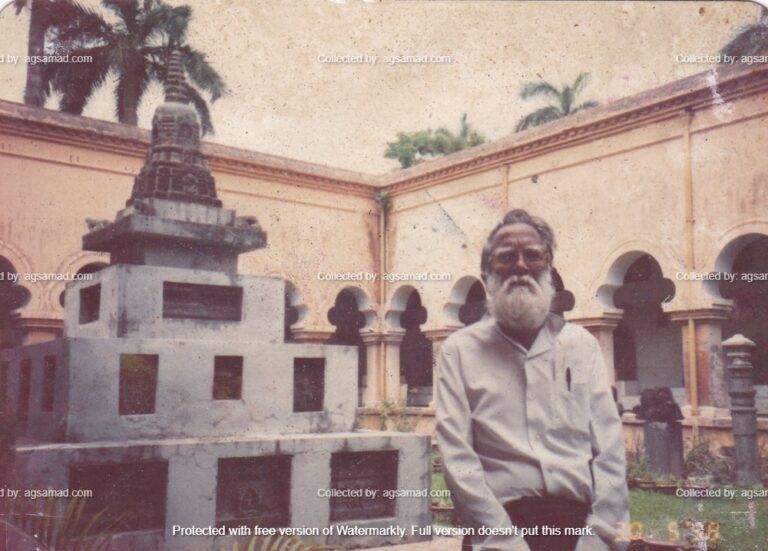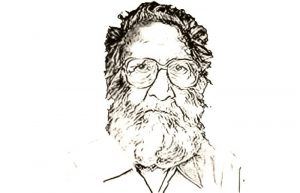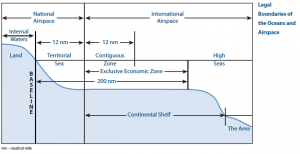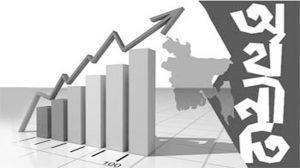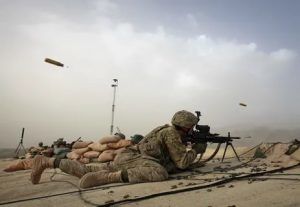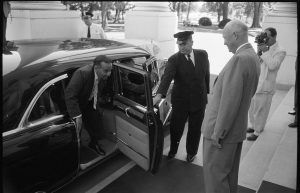Professor Abney Golam Samad is a renowned educationist and intellectual. More importantly, he is a pursuer of knowledge. Aged 62, he spends most of his time outside his professional duties either in libraries or at the study table. This tall, bearded man in untidy clothes looks like a philosopher whenever he walks in the streets, which he is not. Samad is an ordinary person in his behavior and conduct. Still. His extraordinariness is revealed spontaneously whenever he talks.
Although Samad is a teacher, his identity as a ‘writer’ has surpassed his professional character. The nation now recognizes him as an explainer of Politics and History. The interest of his readers in him knows no bounds. To quench this curiosity, we went to meet him though after knowing that he won’t agree to talk to us that easily. But finally, he gave in to our insistence, and in turn, we also had to accept some of his conditions.
As an individual, Samad is not that important. As a result, the public doesn’t need to know about his personal life. In his words, “I’m not a star that people will like to know about me. MY writings reveal enough about me.” Besides, Samad believes that to honor a person, all one needs to do is to respect, know, and if possible, follow that person’s knowledge and ideology. So, our meeting went along this line of thought.
Abney Golam Samad: Why do you want to interview me? I’m not that type of person.
Nazib Wadood: I became interested in you after reading your write-ups in newspapers. That’s why I’ve come to know about you and your opinions.
Samad: Fine. What do you want to know?
You’re a Professor of Botanical science. But you’ve written about Religion, Anthropology, History, Literature-Culture-Arts, and Politics. How do you maintain the connection between your professional life and your thinking?
Samad: I’ve written most of my books on Botany which are used as textbooks by my students. Apart from that, I’ve been curious about many other topics that is why I’ve also written about them. I don’t write about Botany in general newspapers as the readers might not find any interest in them.
You also write as a dutiful citizen.
Samad: Yes, I feel some kind of social obligation. The political and economic problems of the time when I was born had shaken me to my core. I’ve witnessed or read extensively about many historical events in this region, including the Second World War, the Famine of 1943, the Riot of 1946, the Partition of 1947, and the Birth of Bangladesh in 1971. Reactions about these events pop mn my mind and I write about them thinking that these reactions may help in forming a public opinion to some level.
Once you were in Europe.
Samad: I was a student in France. The Professors of that nation regularly write commentaries and articles in their newspapers. Maybe this practice has influenced my writings.
We were discussing your professional life and your thinking.
Samad: Teaching is my profession. I feel that helping the people of this country to become generally educated is part of my social obligations. Besides, I was born in a Muslim family. When we read the history of Islamic culture, we find that on the one hand, people like Ibn Sina had written books on Medicine and on the other hand wrote books on Music. This culture had a profound impact on me as I couldn’t find satisfaction through writing on a single topic.
Then we can discuss many subjects.
Samad: (Smilingly) Yes, we can do that.
For example, Religion. A very sensitive and important topic.
Samad: If you add Politics to it.
This is the question I want to ask. Nowadays discussions in favor and against Religion and Politics are going on all over the world. Once you had worked on Comparative Theology. How do you analyze the relationship between Religion and Politics in the Bangladeshi context?
Samad: I don’t see any reason to think of Religion and Politics as against each other. Religion provides us with some values according to which we want to lead our life. Politics can’t avoid these values if it wants to develop a social life. That’s why Religion has influenced Politics throughout times. Even the United Kingdom (UK), the country from where we’ve developed the concept of modern democracy, hasn’t been able to deny religious values.
Can you explain?
Samad: There was a time when people of the UK used to say “When Adam delved and Eve span who was then gentlemen?” To establish democracy in the UK, arguments from the Bible were used. They said “We all are the children of Adam, so there can’t be any difference. Everyone must have democratic rights.” Judaism, Christianism, and Islam- all three religions were born out of the deserts of the Middle East. All of these religions were monotheistic. When you analyze them, you find that all of these religions are talking about the same things. Allah is such a force that he punishes the oppressor and rewards the honest. The aim of all of these religions is to give birth to such a moral state where people can live in an organized way. In its initial days, Politics used to say the same thing. That’s why Religion and Politics can’t be viewed as ideally different.
But we don’t see any political movement which is based on religion among the Jews and the Christians except Israel. How would you describe that?
Samad: Today’s Israel is based on Zionism. But the Jewish land established by Prophet Moses wasn’t so. He tried to establish his nation based on the laws prescribed by Allah. When I talk about the Jewish religion, I’m talking about that old religion of the Prophet Moses. The Old Jewish religion doesn’t clash with Islam. The same can be said about Christianity. Although Jesus couldn’t establish a nation, he too wanted to establish the laws of Allah. According to Syed Amir Ali, the concept of humanity is abstract in Christianity, whereas Islam has tried to make it real through specific laws. Poet Iqbal has also tried to speak of the same thing.
We can go back to our previous discussion. You said that religion and politics can’t be differentiated, In that sense, Islam is a lot more political religion.
Samad: Yes, In Islam, religion and politics are inextricably connected with each other. Islam had revealed itself as a national ideology in Medina. Those who believe in Islam don’t want to see the concept of religion and politics differently. But, the power struggle is a reality in religion. Religious values play a minor role in the power struggle, which gives birth to many accidents. Many evil instincts of human beings are revealed through power struggles. That’s why Islam recognizes the existence of Satan and says to establish justice through defeating him. From the outset, Islam has talked of running a nation through discussions. That’s why the seed of democracy is inherent in Islam. Modern states emphasize the welfare of their citizens, which is also a talking point in Islam. So, the idea of a modern welfare state isn’t contrary to Islam. After taking all these points into consideration, it can be said that religion and politics can’t be separated.
You’ve said that Islam originated in the deserts of the Middle East and established itself in Medina. Can it be applied to Bangladesh?
Samad: Islam is a missionary religion. Although it originated in the deserts of the Middle East, it has spread to all corners of the world, including the remote jungles of Indonesia. There is a unity between the main problems of human beings. That’s why Islamic values can be freely used to solve the problems of humankind in all geographic environments.
Some people say that the Bangladeshi people have accepted the liberal view of Islam, but the political and military concepts of this religion don’t go with their mindsets. As a result, religion-based politics won’t have a footing in this nation. Does historical oversight say the same thing?
Samad: Muslims were ruling this part of the world prior to the arrival of the British. It’s not that the behavior of these Muslim rulers was completely in line with Islamic values, but Islam was well-established as a state religion. Showing kindness to the poor and running the judiciary according to Islamic laws was the ideology of this state. We can debate on how much this ideology was followed. But there was the existence of an ideology. During Bengal’s Sultani period, many independent Sultans had mentioned the name of the then Khalifa of Baghdad in their coins. This means that these Sultans thought of themselves as the representatives of one Islamic empire. They had an obedience towards the Khalifa of Baghdad. So there is no reason to think that there was an absence of Islamic spirit here.
Are you trying to say that global Islamic brotherhood and an independent Islamic national spirit have been present in the Bengali Muslim psyche from the beginning?
Samad: Although not very organized, there was always the presence of a spirit. After religion, Persian language and literature have given unity to the Bengali Muslim psyche. It is said that Bengali Sultan Giasuddin had asked Persian Poet Hafiz to become a member of his court. Certainly, the Bengali sultans had an interest in the Muslim world and civilization. Persian was the spoken language of Muslim courts and noble families of that time. What is known as the Muslim Bengali language is filled with Persian and Arabic words. People from a large part of Bengal used to speak this language. There was an independent written form of this language. The books published in this language had a distinct feature, which is that the last page of these books used to be the first page like Persian and Arabic books. This literature is known as ‘Manuscript Literature’. According to Linguist Dr. Muhammad Shahidullah, this could be our Bengali language unless the British arrived here.
Does this mean that the Islamic spirit is deeply rooted in Bengal?
Samad: Bengali Muslim doctors have practiced their own way of treating patients. Muslim students have read poems of Sheikh Sadi in Bengali Muslim educational institutions, and Bengali Muslim poets have taken their inspiration from the Persian language and literature. While Hindu litterateurs have written on the glories of their gods and goddesses, Bengali Muslim litterateurs have written on the lives of ordinary people. The engravings found in Bengali mosques are inspired by Islamic designs. So it can’t be said that Islamic culture is a sudden trend here. The best example of Islamic arts and culture is in its architecture. During the Sultani period, a distinct architectural style was developed in Bengal. The Choto Sona Masjid is a glaring example of this. Bengali folk music was inspired by Persian, Arabic, and Turkish folk music. Hindu women don’t sing any songs during their marriages. But, in Bengali villages, wedding songs are a must during any Muslim marriage. All of these bear the identity of the individuality of Islamic culture. It’s a historical fact that Islamic culture has been influencing Bengali culture for thousands of years. Today’s Bangladesh is the result of the struggle of Bengali Muslims. This is the reality, this is the history.
Many people will disagree with your opinion. You were an organizer of the liberation war. Which spirit influenced you?
Samad: Different people have used the term ‘Liberation War’ in different terms. The liberation war of 1971 had two faces. The people of Bangladesh wanted to establish a separate, independent nation, while India wanted to break up Pakistan and make Bangladesh its province or protectorate.
Are you trying to say that the freedom fighters were divided into these two groups from the beginning? Did these people have any organized form or structure?
Samad: These two sections were active in an organized way. One section was led by the late Tajuddin Ahmad, while another section wanted to find leadership from Khondker Moshtaque. However, on a personal level, I had accepted the liberation war in the first sense, which is to form an independent nation. I didn’t have any contact with the pro-Indians.
But you had gone to India. Your statement had been broadcast from Akashbani Delhi center.
Samad: That’s true. But I didn’t say anything in favor of India in my statement. I had said that we want an independent, democratic Bangladesh and that’s why the world has to support us. I had appealed to the international community, not to the Indian government. I used Akashbani just as a broadcasting medium. I used to think that India’s intention will fail, so for now we can take help from them as part of our strategy. The spirit of our liberation war was dependent on our will to establish a separate nation. We didn’t fight to establish or reject any religious belief. A nation is comprised of people and religion plays a vital role in people’s lives. Religion had also influenced us-inexplicitly. According to an Indian estimate, around 90 lacs (9 million) people had left Bangladesh and had taken shelter in India in 1971. Among them 20 lacs (2 million) were Muslims and 70 lacs (7 million) were Hindus. According to another estimate, 80,000 people among these refugees were freedom fighters, among whom only 200 were non-Muslims. This means that others didn’t take part in the liberation war as Bengali-speaking Muslims did. What is called the spirit of the liberation war was present among the Bengali Muslim youths. The descendants of those who had fought against the British under the leadership of Titumir and Dudu Mia had fought the Pakistanis in 1971.
Does this mean that the religious sentiment which was active in the Bengali Muslim psyche had played an influential role during the liberation war of Bangladesh?
Samad: ‘Jihad’ means fighting against injustice and oppression. Maybe this ‘Jihadi’ tendency had become active among the Bengali Muslim youths during the freedom struggle.
But nowadays some people are trying to portray the spirit of the liberation war as anti-religion.
Samad: Those who are trying to speak of a pro and an anti-force of the liberation war nowadays are doing so out of a vested interest. I don’t support this stance. The problem in 1971 was achieving freedom, the problem now is to protect it. I think only one country can risk our freedom and it’s India. That’s why now I want to consider all those political parties who oppose India as pro-independence because only the unity of the anti-India forces can protect our freedom.
Are you saying to form this unity without questioning who played what role during 1971 and 1975?
Samad: Yes. The context of 1971 and now isn’t the same. Those who were the supporters of Pakistani nationalism in 1971 can be the supporters of Bangladeshi nationalism now based on the same logic. None of these people are supporters of a united Indian nationalism. I think the pro-Pakistan mentality of 1971 can work in favor of Bangladeshi nationalism in today’s context. The history of this subcontinent teaches us to come to this conclusion. Our nationalism can’t exist denying the Muslim spirit.
Do you think that the pro-independence group is currently stuck in a blind, passionate stalemate? What should they do?
Samad: I’ve said previously that the context of 1971 and now is different. Decisions have to be taken after analyzing the changed circumstances. National politics can’t be run without national interests. There can be ideological differences and a clash of individuality between different political parties. But the national identity of Bangladesh will be endangered if the political parties of the country go on doing politics devoid of national interests.
Most people agree that the situation has changed. But the pro-independence, pro-India section demand that this change is negative, backward, and dangerous for the country’s independence. What do you think?
Samad: I don’t think so. Every nation builds up according to its history. It’ll be suicidal if we try to deny our history. Today’s Bangladesh didn’t form through the break-up of India, rather it was Pakistan. The Bengali language movement took place within the state structure of Pakistan. Such a type of movement didn’t happen in India. We can’t deny this specialty of our history, otherwise, this will be real backwardness.
The Tamil people in India had waged a language movement.
Samad: Yes. But that wasn’t as strong as the Bengali language movement.
What should we do in this situation?
Samad: The Conservative Party and The Labour Party in the United Kingdom had formed a coalition government during the second world war. We’ll need to form such unity if needed.
Is such an extreme situation currently existing?
Samad: No. But we need to adopt political programs while thinking of the possibility of such a situation.
You’re deeply interested in politics. I’ve heard that you had participated in politics before and after the liberation war.
Samad: No, I’ve never taken part in applied politics. But I’ve always thought of political problems. That’s why I studied politics during my free time. Besides, I was born during times of political upheaval. Various political concepts and thoughts have influenced me throughout my life. I’ve believed in democracy and wanted economic equality at the same time. Though I wasn’t a communist, I’ve believed that a person must have the right to work and live in a society. The Hindu-Muslim struggle is a historical truth in our subcontinent. I’ve wanted an end to this struggle by accepting the issue but didn’t support the attempts to do politics based on it. I don’t believe that one has to criticize Islam in order to be progressive. I think that there are a lot of elements in Islam based on only which true human welfare is possible. I don’t support any kind of bigotry.
How does the concept of bigotry and liberalism look in Islam?
Samad: There is something in Islam called Ijma. Ijma means running the society by forming laws based on general agreements reached between people. Religious bigots think that the explanations of Islamic laws given by ancient Islamic Jurists are final and the way to modern interpretations has been blocked. Progressive Muslims don’t think in this way. They think that there can be a need to form new laws or provide new interpretations of old laws in new situations. If the doors to Ijma are closed, Muslims will find it hard to cope up with the changed circumstances of the present world. That’s why Iqbal had inspired to resurrect the right to Ijma in Muslim society.
Do you think that the concept of Ijma can play any role in practicing democracy in Bangladesh?
Samad: Yes. Islam started its journey from a city like Medina. The democracy that was in Medina was like the city-states of ancient Greece. There wasn’t any opposition party in this democracy. The concept of an opposition party is a notable aspect of modern democracy. But in many cases, democracy has failed due to intense conflict between rivaling political parties. Ijma means general agreement, not an agreement between two political groups. The concept of Ijma can play a vital role in reducing partisan politics in our country. The partisan conflict has to be reduced to make democracy successful here. An individual has to take a decision depending on the decision of his conscience, not through partisan thinking. Partisanship and democracy for people’s welfare can’t be synonymous.
You were saying a while back that the conflict between Hindus and Muslims is a historical truth. How do you view this problem now?
Samad: I want to see this issue in a different light. The United Kingdom (UK) isn’t a secular nation. The state religion of the UK is Anglican Christianity. We too have a state religion. The citizens of this nation will enjoy equal benefits. But the head of state has to protect the state religion. So he/she has to be Muslim. Every nation has some rules and regulations for its head of state. No Catholic can become the King in the UK yet. In Sweden and Norway, the King has to be a Lutheran Christian. In the United States, the President will have to be an American by birth. For historical reasons, I think that the state power in Bangladesh has to be in the hands of a Muslim ruler. Although he/she will be elected in a democratic way. People of all religions will get equal rights here. But the final authority has to rest in the hands of a Muslim leader for matters related to state security. Maybe we won’t need this in the future but for now, it’s needed as Islam is our spiritual weapon in the context of our current subcontinental reality.
Do you have any support in favor of this claim?
Samad: I’m not the only proponent of this view. Muzaffar Ahmed, one of the founders of the Communist Party of India, said the same thing in his autobiography. But my attitude has grown based on my own thought process. MN Ray also used to think that the Hindu-Muslim question is a real issue and it has to be dealt with special care. Ray has tried his utmost to understand the Muslim civilization. That’s why he had written a book on the historical contributions of Islam. No one else had done so, he was special in his own way.
Religion, politics, and liberation war have found primary focus in our discussion.
Samad: Yes. I had to speak a lot about religion during answering your questions. But I don’t think that human lives revolve only around religion. Humans have to acknowledge a lot of aspects of life to keep on living. I had to talk about the liberation war also. I didn’t want to get involved in any sort of trouble in 1971. But I had to face death due to a turn of events. That’s why the spirit of liberation war also found its place in our discussion.
Now we can talk about the student-teacher topic.
Samad: Tell me what you want to know.
It is heard all the time that our students are overly political.
Samad: That’s true. Among all the aspects of life, our students pass most of their time in thinking about politics. Our students aren’t practicing knowledge like the students of other countries.
Do students are the only ones responsible for this?
Samad: We teachers are also responsible for this to a great extent. The way we teach isn’t conducive to the intellectual growth of our students. We aren’t taking up the teaching profession as it should be. The spread of knowledge of many teachers gives me pain. That’s why I think the quality of our teaching has to be increased to increase the quality of our education. Many students ask- what will happen after knowing so much? Our education system is running on the pretext of securing a good job by doing well in examinations without knowing too much. There won’t be any change to the economy of the nation without solving this difficulty because the scientific application is needed to do so. And to understand the science of today, we need to give more effort than ever before. Economic liberty won’t come in the way that is talked of. It’s only possible through applying science and knowledge.
Doing politics is also responsible for this – what do you say?
Samad: Of course. The weakness of our politics is that it’s dependent on students, not the entire population. To get rid of this weakness, public awareness is needed.
Have you ever wanted to influence your students through your thoughts?
Samad: I’ve spent a long time in teaching. But I’ve never wanted to do politics with students. I’ve expressed my opinions by writing in newspapers. If any student has been influenced by them, it has happened indirectly.
You used to write for Samakal in the ’60s, which was a leftist publication. Were you leftist back then?
Samad: I didn’t know Sikandar Abu Zafar, the Editor of Samakal, from before. I came to know him through writing. He was modern, but not a leftist. People from various backgrounds used to write for Samakal, among whom Al Mahmud became a renowned Poet later on. I developed a deep relationship with Mahmud through Samakal. I used to like his poems. Most of the time, I used to write for Samakal to fill up the pages. There was a dearth of writers in Dhaka at that time. Besides, I didn’t even write literature. Sikandar Abu Zafar published my first book “Shilpokolar Itikotha (The History of Fine Atrts)”.
You were associated with publication in Kolkata during 1971. Sikandar Abu Zafar had also brought out a publication. Did you work together at that time?
Samad: Sikandar went to Kolkata in 1971 and brought out the weekly publication “Obhijan” following the directives of Khondkar Moshtaque Ahmed. He told me to write for his paper, which I couldn’t do due to lack of time. Two to three issues of the paper had been published, after which the war ended.
You used to publish Awami League’s publication “Joybangla” in Kolkata at that time.
Samad: Yes. I also wrote some of their leaflets. But I was never part of the party officially.
Won’t you say anything about your personal life?
Samad: There is nothing special to say. I haven’t done anything in my life about which I can say proudly. When I think of the bygone days at this late hour of my life, I feel like a wayfarer, who wants to travel faraway lands, to whom the happiness found during the journey is everything. I’ve found happiness in learning about many things, becoming a sage was never my intention, I just wanted to explore, experience, and be happy with it.
Are you doing anything special now?
Samad: Besides writing for newspapers, I’m writing a book on Musicology.
Are you writing it of your own volition?
Samad: Yes.
We have found that you mix with youths more than with aged people.
Samad: A young heart is always active. Young people are the symbol of the future. I go about with them because I’m hopeful about them (Dr. Samad smiled while raising his eyebrows. Like always, his sharp eyes glimmered spirit of youth).
